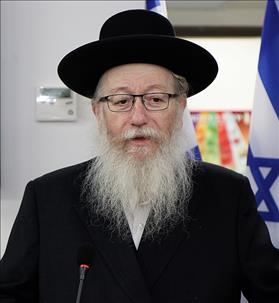Women of the Wall, conversion, kashrut, and funding for yeshivas
Religion and State issues not pushed under the rug
It is critically important to understand that despite the sense of urgency regarding Israel’s political, security and health concerns, issues of religion and state have not been pushed under the rug. They continue to be at the forefront of political controversy and in the headlines.
Uri Regev 13/08/2020 23:58
Tags: Shas · United Torah Judaism · UTJ · yeshivas · national service · IDF enlistment

Yaakov Litzman, source: Wikipedia
Anyone who follows the news coming out of Israel is aware that even as concern over the second wave of COVID-19 grows, the political arena is heating up. And many believe that Israeli is facing a political explosion and going to its fourth election in less than two years. Many commentators offer various explanations for this, and most link it to Prime Minister Netanyahu's approaching criminal trial.
However, it is critically important to understand that despite the sense of urgency regarding Israel’s political, security and health concerns, issues of religion and state have not been pushed under the rug. They continue to be at the forefront of political controversy and in the headlines.
Just yesterday, alongside dramatic votes on bills regarding a person's eligibility to run for Prime Minister when criminal charges are pending against him, as well as an attempt to postpone the political explosion by pushing back the deadline for the adoption of a state budget, issues of religion and state were also debated in the Knesset plenum. These included Women of the Wall, conversion, kashrut certification, and funding for yeshivas.
For those who are wondering why the ultra-Orthodox parties are at the forefront of the effort to prevent early elections and attempts to patch up the growing rift between Likud and Blue & White, the explanation can be found in their realization that early elections would undermine the implementation of these parties’ two main demands.
Furthermore, for those who are wondering why the ultra-Orthodox parties are at the forefront of the effort to prevent early elections and attempts to patch up the growing rift between Likud and Blue & White, the explanation can be found in their realization that early elections would undermine the implementation of these parties’ two main demands:
- The tremendous state funding for the yeshivas requires that the State budget be passed by the Knesset, and
- An IDF enlistment law must be passed to protect yeshiva students from service because the sword is about to come down in the Supreme Court in the matter of the blanket exemption granted to all yeshiva students.
Given the reality in which large swaths of the political system repeatedly succumb to the pressure of the ultra-Orthodox parties, the role of organizations like Hiddush becomes ever more important. Such organizations stand at the legal and public front, in protection of the values of democracy and freedom of religion and equality.
This only illustrates the tip of the iceberg. The issues on Hiddush’s agenda range from the right to family, the struggle over equality of civic burden for all Israelis, and the defense of Chabad from unlawful interference by a municipal authority.